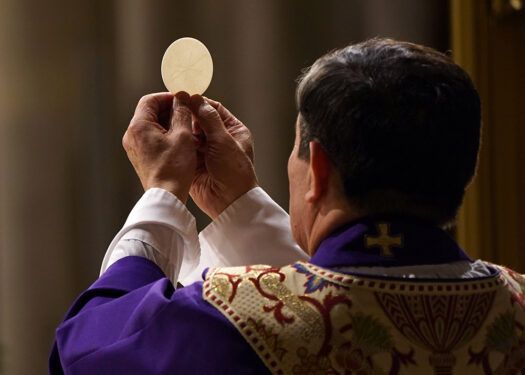
WASHINGTON — Each year at Easter, thousands of people across the country are welcomed into the Catholic Church. They are drawn by a number of reasons, but one that particularly stands out — as the Church is in the middle of a three-year Eucharistic Revival — is the Church’s teaching and emphasis on the real presence of Christ in the Eucharist.
Father Bryan Brooks, pastor of St. Benedict’s Parish in Oklahoma City, writes on his parish website that there were two main factors in his decision to become Catholic when he was a college student: the sense of community and “the belief in the real presence of Christ in the Eucharist.”
He’s not alone here. Father John Anthony Boughton, a Franciscan Friar of the Renewal, and one of the eucharistic preachers named by the U.S. Conference of Catholic Bishops for the three-year Eucharistic Revival, told participants at an Indiana parish event last year that growing up as a Protestant he didn’t believe Jesus was truly present in the Eucharist.
He said that after having discussions about Communion with several Catholics, he started to examine the biblical passage of John 6 where Jesus speaks about the Eucharist, and it started to dawn on him that the body and blood of Christ was not just symbolic or a figure of speech.
“I knew in my heart of hearts there was no other place I could be if this teaching is true,” the priest said at an event, covered by the Northwest Indiana Catholic, diocesan newspaper of Gary, Indiana. “It’s been a constant teaching of 2,000 years of Christianity that Jesus is truly present, body, blood, soul, divinity, and humanity on the altar at the hands of a priest, then there’s no other Church I could possibly be in.”
That same biblical passage similarly influenced Bishop James Conley of Lincoln, Nebraska, and likewise inspired his conversion to Catholicism as a college student.
In a column he wrote in the Southern Nebraska Register, diocesan newspaper of Lincoln, he said that while he was studying at the University of Kansas, “the truth of the real presence of Jesus was instrumental to my eventual conversion to the Catholic faith.”
He said the words in the Gospel of John about the flesh and blood of Christ bringing eternal life to believers “continued to intrigue me.
“If I really believed these words to be true, then I had to become Catholic,” he said.
A similar story is told on the website of the Coming Home Network, a ministry to returning or new Catholics, that highlights the experience of Norman McCrummen, a former Presbyterian minister who said he was drawn to the Catholic Church by its teaching on the Eucharist, and he also used John 6 as his guide.
“I am Catholic because I believe in the real presence of Jesus in the Eucharist. I take literally the words of Christ as found in the sixth chapter of the fourth Gospel,” he said.
He said he grew up “learning from Sunday School teachers to take the words of Jesus literally, except when it came to the sixth chapter of John’s Gospel; although I must say I never once heard a teacher tell us, ‘You mustn’t literally believe the sixth chapter of John’s Gospel.’ What I heard many times was that the Lord’s Supper was a memorial meal. Period.”
As he eventually fully embraced the Catholic faith, he said he received graces from receiving Communion that he desperately needed in taking care of his mother who suffered from dementia as well as his wife who was diagnosed with an early onset of Alzheimer’s.
“The wealth of this grace is beyond measure,” he said.
Scott Hahn, a well-known Catholic author and speaker, was similarly drawn to the Catholic Church through the Eucharist.
In his book, “The Lamb’s Supper,” the former Presbyterian minister recounts attending his first Mass, as an observer, and having his eyes opened about what was taking place.
He similarly recounted this experience on the episode, “A Convert’s Guide to the Eucharist” for the podcast “The Cordial Catholic,” where he said that Mass, in the basement chapel at a Catholic college campus, left him transfixed and stunned and unable to get up from the pew an hour later.
“I found something I wasn’t looking for,” he said, about the Eucharist, and noted that five months later he was received into the Catholic Church.
He said often Catholics are “so accustomed to the real presence” of Christ in the Eucharist, even if they don’t believe it, and he said he finds it “amazing how unamazed we are by this” teaching.
Sister Alicia Torres, a Franciscan of the Eucharist of Chicago and a member of the National Eucharistic Revival’s executive team, told The Tablet: “The fact that one must make an assent to the doctrine of the real presence to become Catholic is a reminder to cradle Catholics of the profound treasure we have in this august sacrament.”
This June, the Catholic Church begins Year Two of its Eucharistic Revival with the Year of the Parish Revival where parishes will provide activities and events such as catechetical formation on the real presence of Christ in the Eucharist and extended opportunities for eucharistic adoration and the sacrament of reconciliation.

It’s a nice national story, but tell me what the Brooklyn and Queens priests say. Was the Eucharist the reason our RCIA participants came to the Catholic church?